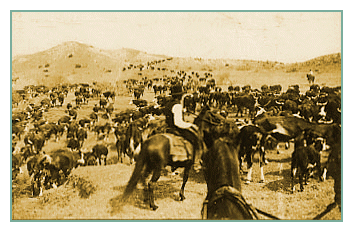herd

n. A number of beasts assembled together; as, a herd of horses, oxen, cattle, camels, elephants, bucks, harts, or of swine. Herd is distinguished from flock, as being chiefly applied to the larger animals, as a flock of sheep, goats, or birds. A number of cattle, when driven to market, is called a drove. One who herds or assembles domestic animals; – much used in composition; as, a shepherd, a goatherd, and the like. v.i. To unite or associate in a herd, as beasts; to feed or run in collections; as, many kinds of beasts manifest a disposition to herd. To associate; to unite in a company or in companies, by custom or inclination. — Webster, 1882
 [The cattle] went by in a herd, with trampling hoofs and tossing horns. – On the Banks of Plum Creek, Chapter 6, “Wreath of Roses”
[The cattle] went by in a herd, with trampling hoofs and tossing horns. – On the Banks of Plum Creek, Chapter 6, “Wreath of Roses”
 Animals mentioned in the Little House books as moving in herds include antelope, buffalo, cattle, and deer. Although the Wilders owned many sheep in Farmer Boy, Laura Ingalls Wilder never mentions them as a herd or being watched by a shepherd.
Animals mentioned in the Little House books as moving in herds include antelope, buffalo, cattle, and deer. Although the Wilders owned many sheep in Farmer Boy, Laura Ingalls Wilder never mentions them as a herd or being watched by a shepherd.
A herd can be driven to move in a certain direction, as Laura Ingalls does by waving her arms and running ahead of Pete the Ox in On the Banks of Plum Creek (see Chapter 7, “Ox on the Roof”). When faced with danger, individual animals will try to move to the center of the group for protection, and this repeated action will make the herd move in unison.
In Little House on the Prairie, cattle being herded to Fort Dodge were said to travel near the Ingallses’ cabin in Indian Territory. In the years after the Civil War, all range land was declared to be open and free government lands, and all persons had an equal right to use it for grazing purposes. In the spring of the year, as soon as new grass began to grow, crews of cowboys would gather or “round up” cattle on the open range, no matter who owned it or what brand it carried. These cattle would be herded along trails to certain locations where they were shipped out for slaughter. Fort Dodge was located east of Dodge City in 1864, at the crossing of two established trails, one along water and the other one a dry trail. Fort Dodge was abandoned in 1882, as troops were sent nearer to Indian Reservations. In 1886, the 12,000 acres were staked off and opened for settlement.
Herd boy. A herdman / herdsman or herdwoman / herdswoman is the owner or keeper of herds; the one employed in tending herds of cattle primarily in areas where there were no fences to contain them. Since Johnny Johnson in On the Banks of Plum Creek isn’t a grown man, he is referred to as a herd boy. In many cultures, young boys leave their families and travel with a grazing herd for months at a time, either sleeping on the ground or in tents. Since Johnny Johnson seems to have returned the cattle to their owners each evening, he most likely boarded at Mr. Nelson’s or was close enough to his own home to return there each night.

herd (LHP 8, 13; BPC 6, 25-26, 33; SSL 7; TLW 5, 20; LTP 8, 18; PG), see also china shepherdess, Good Shepherd
Lady races antelope herd (TLW 20)
antelope (TLW 20; LTP 8; PG)
buffalo (LHP 22; SSL 30; PG)
herd boy (BPC 6-7; PG), see also Johnny Johnson

